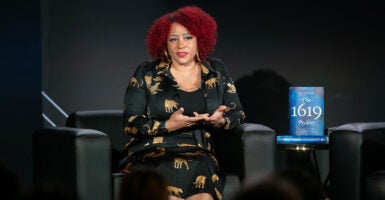The left makes a big deal about teaching race in America. From the 1619 Project to critical race theory, the left claims that America is irredeemably steeped in racism and that race should be the central focus of all aspects of American life.
Delano Squires, a homeschool father and scholar at the pro-America education group 1776 Unites, says that isn’t helpful. Hyperfocusing on race and racism sows division, and also foments hatred for America, he says.
“It doesn’t matter what country or what ethnicity, because I can’t think of any institution in which a person flourishes when they hate the institution,” Squires says. “I don’t know of anyone who hates their wife that would then say that they have a good marriage, or hates their job and then turns around and says, ‘Yeah, I want to work there for the next 40 years.'”
Squires joins “The Daily Signal Podcast” to discuss how race should be taught in our schools, and why the left’s brand of race-conscious education is a bad idea.
We also cover these stories:
- Austrian Chancellor Karl Nehammer meets with Russian President Vladimir Putin, the first time a European leader has done so since Russia invaded Ukraine.
- President Joe Biden announces new gun control measures that he says are aimed at “ghost guns.”
- A new poll from CBS News and YouGov finds that Biden’s approval rating is at an all-time low.
Listen to the podcast below or read the lightly edited transcript.
Douglas Blair: My guest today is Delano Squires, CEO at the Civitas Consulting Group, scholar at 1776 Unites, and a homeschool father. Delano, welcome to the show.
Delano Squires: Thank you for having me.
Blair: Of course. We wanted to talk to you very much because you have the experience in D.C. about how the education system failed your family. So you took your kids out of the D.C. education system. What led you to that decision?
Squires: It was a decision that was a couple of years in the making. Some of it was based on what we felt we were not getting in the school system. And some of it, honestly, was just a natural faith evolution for both myself and my wife.
Long story short, we had our daughter enrolled in a public charter school for one year in the District. It was a good school. The staff was friendly, her teachers were really responsive. She got homework every night.
I had some questions about the structure of the school. It was very orderly and structured, which I think is a good thing. But sometimes for some kids, they may not react all that well, but she was doing well on that front.
But the first thing that made me reconsider at least what the school was doing is when I noticed that they had one of these books that promotes “social justice,” called “A is for Activist.” It wasn’t in my daughter’s classroom. It was in a different classroom that was on a different floor. That made me think about, “OK, what direction is the school going in?”
And then come February of that school year, they unveiled a large Black Lives Matter poster with the faces of Michael Brown and Trayvon Martin and other individuals who were either killed by the police or vigilantes.
And I just emailed the principal to ask, “OK, what is the school stance on Black Lives Matter?” Because I’d done some extensive research and I knew that Black Lives Matter was not an organization whose principles spoke to their concern with police brutality, because they never mention police or brutality in any of the principles.
I knew that they were more concerned about their views and their worldview related to feminism and in terms of being LGBTQ-affirming and their desire to disrupt the Western-prescribed nuclear family—as they put it.
So I just wanted to know what the school thought about it. He never responded to me, and that actually was the perfect opportunity to reevaluate what we were going to do with our daughter’s education.
Then came COVID in March of that year in 2020, and as I said, it was a good time for us to think about what direction we want to go in. And most importantly was the faith aspect, which is, I began to see education not just as reading, writing, arithmetic, but as equal parts scholarship and discipleship. So that’s academic mastery and moral formation.
And when I began to understand that as a Christian and a Christian father, it was my responsibility to train up my children in the fear and knowledge of God, … I realized that the government schools or public charter schools would not be able to do that, and I think that’s really what necessitated that change.
Blair: Do you see that your kids, since they were in that school system for a little bit, do you think that they took any of that messaging back with them? I know a lot of parents have been seeing that their kids have gotten some of this critical race theory, social justice from their school system. Do you feel like your kids kept any of that from their time in the school system?
Squires: No. Our daughter at the time was 3. For people who may not know, D.C. starts its pre-K programs at 3 years old. So she was a slightly older 3 because of her birthday. But I didn’t see anything in her classroom that spoke to that.
I’m not sure what it looks like now or what it looks like for older students. One thing I’ll say is this, a lot of times, it’s not necessarily the school is engaging in certain types of instruction in the classroom. It’s that the school’s sort of operating principles put them into that lane.
So one place to look for a lot of parents would be social media. So if you check the school’s Twitter page or their Instagram page, you can get a sense of where the school lines up in terms of its worldview and how it incorporates issues of, matters of race or sex, sexuality, gender identity into the way it does business.
Because a lot of times what happens is that the schools don’t necessarily want parents to know everything that they’re doing. But if you pay attention, you can pick up some subtleties and see, OK, this is the direction I see this school going to. And I think for parents it’s at the moment you feel like something is going in the wrong direction, that’s when you need to speak up.
Blair: Now, this is a topic I think that a lot of people are very curious about, because when they hear about how race is taught in schools, it is very much through that lens of Black Lives Matter or the 1619 Project. How do you think race should be taught about in schools?
Squires: That’s a great question. I don’t know that race needs to be taught.
I’m a person that believes, because this often comes up as it relates to American history, I believe in teaching the good, bad, and ugly of history, regardless of who we’re talking about. Even if I was talking to my own children about our larger family history, I wouldn’t hide things from them out of fear of how it would make them feel—obviously, age-appropriate.
So, I’m not for “whitewashing history” in any way, shape, or form. And I know that can be uncomfortable for some parents because the natural human instinct is to cover your shame. That’s why it’s a lot easier for us to do in-depth studies and be critical of Nazi Germany than it is for us to talk about, for some people to even talk about what was the cause behind the Civil War, right?
That being said, I think the problem comes in when schools move from saying, “This is where we were,” or, “This is what happened years before,” “This is what life was like in America” to “This is what life is like in America.”
The problem comes in when you go from saying, “The Ku Klux Klan was an organization that rose during the Reconstruction period and the people who were in it believe these things about blacks and Jews and other nonwhite individuals, therefore, the white people you see today carry the stain of the clan wherever they go, and this country is irredeemably racist.” That pivot point is where the problems almost always come in.
And I think that is the thing that needs to be opposed by all parents, not just white parents, but black parents as well because of what it does. It plants seeds of alienation, particularly for black Americans, because it leaves them thinking that the country that they live in 2022 is no different than the country their ancestors inherited or lived in in 1822.
And national alienation is always a problem. It doesn’t matter what country or what ethnicity, because I can’t think of any institution in which a person flourishes when they hate the institution. I don’t know of anyone who hates their wife that would then say that they have a good marriage or hates their job that says, and then turns around and says, “Yeah, I want to work there for the next 40 years.”
So I think we should teach history as it happened. I don’t think we should try to soften it. Again, obviously, age-appropriate. I think we should also teach particularly … I was going to say particularly for black students, but no, I think we should also teach messages of triumph.
One of the things I love about being affiliated with 1776 Unites’ project is that there’s no turning away from the things that took place in America, but it’s, OK, these are the ways in which black Americans triumphed and overcame and persevered and succeeded in spite of the conditions that they faced 60, 70, 80, 100 years ago.
So we talk about figures like Biddy Mason, [who] went from slavery to becoming a millionaire, or Robert Smalls, who commandeered, I think it was a Confederate vessel and ended up fighting for the Union.
So these are individuals who students can look to and draw from, because to me, history, if it’s taught properly, one, should be informative. It should make us reflect on how far we’ve come. But if we want to use it for where we are today, it should be a battery in our back to charge us forward, not an anchor around our neck to weigh us down.
So I’m for teaching the truth, right? Regardless of what it may look like. But I’m not for indicting people of today for things that were done by people who look like them.
Forget about ancestors, because I grew up in New York. So most of the white kids I went to school with did not have ancestors from the deep Confederate South. It was Russian and Polish and Italian and Irish immigrants. So those weren’t their ancestors. “But you look like someone who did something wrong to someone who looked like me 200 years ago, therefore, you should have to pay for their sins.” And I don’t think that’s that’s right. And certainly not biblical.
Blair: It’s interesting that you mentioned that because when you were talking, I remembered something that Morgan Freeman said, I think he’s sort of gone back on this, but he asked, “Why do we have a Black History Month?” It’s American history, right? Black people are a part of that history. So my question for you then is, do we need to separate it out? Is there a need for a sort of like specific study of black people? Or do we just say, “Frederick Douglass was a really great American man? Here’s what his story is”?
Squires: Again, a great question. I see both avenues as viable, depending on the context. One of the issues that’s hard to get around is that race has always … played an important role in our country, right? Whether from the protection of rights or the distribution resources. So I think for some people it’s hard to think about getting rid of “race” at this stage in the game.
That being said, I do think Frederick Douglass is an American hero and one of the things that I like to see is people like Douglass and Booker T. Washington, not just Rosa Parks and Martin Luther king. Obviously, they’re great American heroes and we celebrate them, but people who may be lesser known, Mary McLeod Bethune or whoever it is, I like to see those people’s names being brought up. I’d like to see the things that those people taught. Their contributions being brought up in the other 11 months. …
And really I think we make progress when it’s done by non-black people because Douglass—and actually, my inaugural essay for 1776 Unites was about Frederick Douglass and I called it “Authentic Anti-Racism.” So I juxtapose what Douglass was arguing for at a point when slavery was still legal, in terms of being anti-racist, and what Ibram Kendi argues for, right?
Ibram Kendi is actually pro-discrimination. He just thinks that discrimination today should be used to remedy the sins of yesterday and that discrimination tomorrow should be used to remedy the sins of today. Douglass took a totally different approach. He took a more, certainly what I would characterize [as] a more biblical approach, affirming the humanity of all people, regardless of skin, color, or ethnicity, arguing for true justice, right?
So equal way to measures, again, regardless of who the person is and arguing that black people do not need pity or paternalism from their white American brethren, we need justice. And you can have justice and charity and justice and benevolence, but justice is always the first component.
So maybe in 10, 15 years, we won’t have a Black History Month.
I think one of the blessings of living in America is that you get to see really a unique social experiment play out, where this is not a country where there’s a single ethnicity, right? So there’s not a real context in which a person born in Sweden could ever become Chinese. Doesn’t matter how long they lived in China. And even if they spoke the language, if they told the public or someone in China said, “Oh no, I’m Chinese,” they would look at them, and they would say, “No, you’re Swedish.”
But in America, someone whose family is from China, we accept as American. So to the extent that we see ourselves as strictly American, I think that would work for the cause of social cohesion, whether we get there or not is a different question.
And I’d like to caution people, sometimes when we hear words like “diversity,” they have been so misused and abused that it puts some people on guard immediately. But I think learning about all different types of characters, heroes, and sometimes villains throughout American history does enrich that painting of America as it has been and really, hopefully, as it will continue to be.
So I can see either way going. I don’t mind Black History Month, but I’m also not confined to one month. And especially as a homeschool dad, we teach our children constantly.
So my wife just got some lessons on Egypt. My daughter’s learning about Bessie Coleman and we really want to encourage the kids to be interested in those figures, but not just in people who look like them because sometimes it’s easy to get carried away in representation. Representation is important, it does matter, but sometimes it can be overrated.
Blair: Following up on what you just said about how you teach your own kids, I’m curious what your lesson plans and what your strategy for teaching your kids is because there is a very distinct educational sort of pedagogy right now that is focused explicitly on critical race theory, social-emotional learning, these things that are very much based in kind of leftist ideology. What are you teaching your kids right now?
Squires: First, we teach them that they were created by God. And it is in that fact that they should find their value and where their sense of purpose and dignity comes from. So we start there. So both in terms of God is the center of creation and the center of all knowledge.
So we’re a Christian family and we are trying to teach our children in a way that we pass on our values to the next generation. So that’s a big part of it. But the other thing is, social and emotional learning in its true sense, it’s already baked in because they’re our kids and nobody cares for them more than we do. Right? We’re not using them as puppets in a larger sort of political agenda.
Blair: We consistently see that the radical left proposes policies that are aimed at uplifting black kids in schools. Why do those policies seemingly consistently fail?
Squires: I think it’s because the left and sometimes the right, to be quite frank, start in the wrong place.
So I think of a civil society in the same way I think of a body. There are many different parts that play different roles. What we tend to do in our political discourse is to blame all of the problems in the body on a handful of body parts.
So let’s say that the government is the hands, right? When the family starts to break down—and let’s say the family is, I don’t know, the head. When the family breaks down, everybody starts to look at the hands and say, “Why aren’t you doing more?” Now, what we would do is say, “OK, which part of the body is ailing? How do we get more help to that particular part?”
So people who think that more education spending is going to correct for serious home and environmental issues are not really understanding sort of the full weight of the problems we’re talking about.
Some schools do a really good job. And oftentimes, even when those schools work with low-income parents, whether black or Hispanic or even white, they’re working with parents who may not have a lot of resources, but who are invested in their children’s education.
But if you have a school where the parents are not as invested as they should be, and a child is growing up in an environment of disorder and dysfunction, again, it doesn’t matter what skin color the child is. That child is going to have problems learning. Now, every once in a while you may get an exceptional child who can achieve in spite of those environmental issues.
But I think the single biggest problem with how we talk about education in our country is the fact that we don’t start the conversation in the family, in the home, because parents should be a child’s first and foremost educators. And if the first time a child is ever read to is when they’re 5 years old, starting kindergarten, that is a problem. And that means someone has not been doing their job for the last five years.
So I think that’s one of the biggest problems. I also think that a lot of education spending is spent on central administration. The K-12 environment is starting to look a lot like the college environment, where there are a lot of administrators, a lot of bureaucratic fat that could be trimmed, because a lot of that money does not get into the classroom.
The other thing is that, again, schools are busying themselves with things that have nothing to do with the basic building blocks of an education. So by the time a school introduces the “Gender Unicorn,” you know that things have gone off the rails—when you’re talking to 5-year-olds about that type of thing and not teaching them how to read phonetically. Right? So some of this is pedagogy. So it’s reading by phonics or whole word instruction.
So but when you find yourself engaging in partisan or political activities in the classroom, I think that’s one of the reasons that schools have failed black students and depending on the jurisdiction, white or Hispanic students as well.
But I think, again, I would start the conversation in the family, but that is a difficult conversation. And it’s one in which it’s hard for people to be honest because what ends up happening is that people will look at surveys and they’ll say, “Well, we asked all these families the same question: ‘Do you value your child’s education?’ And they all said yes at equal rates.” So worthless question, right?
You don’t ask that, you ask, on average, how many hours a day does your child spend doing homework or studying? And then on average, how many hours a day does your child spend on athletics or entertainment? And then you compare, right? Because some parents do not prioritize their children’s education in the way that they should. And they push it all off on the teachers. And the schools are more than happy to take on that role.
And that’s what we’re seeing. What we’re seeing now playing out in Florida, in other spaces is really a custody battle between parents and pseudo parents who are schools who think, who forgot that “in loco parentis” is Latin, right? And it means that the school is acting in the parents’ stead. They think that in loco parentis is Spanish, that these parents are crazy, right? And we’re seeing that struggle play out.
That struggle for authority is playing out in real time. And I think that’s why these schools are getting so frustrated, because they’re saying, “How dare you parents tell us what we can do with our children on our time.” And parents, again, fed up with it and saying, “No, these are not ‘our’ kids.”
I’ll give you one quick example. Before we pulled our daughter out of the charter school, we were looking at a private classical Christian school, right? It was in Maryland. So it was outside the city. The demographic, basically all the kids look exactly the same. The charter school was 95% black. The private Christian classical school was 95% black. But when we went there, it was an environment where you could tell that order and structure were valued.
We went into maybe a sophomore math class. And when we got to the door, when we opened the door, when our guide opened the door, the children stood up and greeted us. And my wife and I were blown away because she was a social worker. So she’s worked in public schools. I’m familiar with what goes on and typically it is not that. Right? That type of order is not what you see.
But when we looked at the school’s guidebook, again, it’s classical and Christian, so they said clearly that parents are responsible for their children’s education biblically and that “we, the school,” partner with parents in helping to educate their children. The charter school we were coming from, when they got to the parental section, they said, “Parents are our allies as we teach kids.” It’s a different emphasis. Right?
So the charter school says, “No, education is our job. Parents sort of come along and help us where we need help.” But the other school said, “No, it’s the responsibility of parents to educate their children and we are acting it in their stead.”
And I think that is a worldview difference that we should not minimize because a lot of schools operate in the latter model where they say, “No, we own education. And we have the right to dictate what we say to students and parents. If you’re not going to be our allies, you just need to shut up and move out of way.”
Blair: Right. I think that’s a lot to think about. And we’re very glad to have that conversation. That was Delano Squires, CEO at Civitas Consulting Group, scholar at 1776 Unites, and a homeschool father. Delano, very much appreciate your time.
Squires: Thank you.
Have an opinion about this article? To sound off, please email [email protected] and we’ll consider publishing your edited remarks in our regular “We Hear You” feature. Remember to include the url or headline of the article plus your name and town and/or state.
































